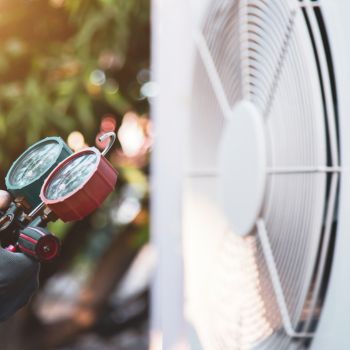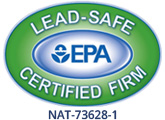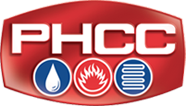Why Is My Air Conditioner Blowing Hot Air?
 When outdoor temperatures start to rise in the spring, it’s important to schedule a professional air conditioning inspection, so your system is ready for hot weather.
When outdoor temperatures start to rise in the spring, it’s important to schedule a professional air conditioning inspection, so your system is ready for hot weather.
If you’ve tested the A/C and the unit is blowing hot air, multiple factors could be at play. Understand what might be preventing your air conditioner from properly cooling your home.
Thermostat Issues
In most cases, the thermostat is to blame, from the settings to how it senses temperature. Common issues include:
- Keeping the thermostat on fan or heat rather than auto. The fan setting simply blows and circulates air, no matter the system’s cooling cycle.
- Too high of a cooling temperature, so the system won’t cool when it needs to.
- Your HVAC system has multiple thermostats and one is sensing a cooler temperature or does not detect the interior conditions.
- The thermostat is not correctly calibrated.
- The thermostat’s batteries are dead and the system cannot sense your home’s temperature.
Clogged Drain Line
Air conditioners are equipped with a drain system that diverts any accumulating water. However, the condensate line or hose responsible for this action may become clogged with dirt or debris. When this happens, you may feel warm air blowing into your home, see water leaking or experience mold growth.
Dirty Air Filters
Accumulating debris restricts airflow, which results in the fan, compressor and motor working harder. At the same time, the evaporator coil cannot fully sense the temperature of the dirty air passing through, reducing its ability to absorb heat. In turn, your air conditioner blows air without actually cooling anything and may eventually overheat, causing the system to shut down completely.
Low Refrigerant Levels
Without sufficient refrigerant, due to a leaking refrigerant line or evaporator coil, your air conditioner cannot cool any air. As this occurs, the evaporator coil cannot transfer heat and the rest of the system attempts to work harder to compensate for the difference. In response, your electric bill may rise and your system may eventually shuts down due to overheating.
In this scenario, warm air coming from your air conditioner may be accompanied by a hissing sound, ice on the outside unit and smoke coming from your system.
Electrical Surge
Especially for homes with indoor and outdoor units, a tripped breaker or blown fuse can result in one component not working. In the case of warm air blowing, the condenser in the outdoor unit may be the problem. To determine this, look at your home’s circuit box and flip the appropriate circuit to see if the outdoor unit turns on and begins to cool the air.
Malfunctioning Compressor
The compressor removes heat from the interior air and pushes it outdoors. Dirt and debris accumulating on the compressor interrupt this process, causing warm air to circulate through the system and return to your home. In addition, your full system may overheat as it attempts to cool the hot air passing through.
Because the compressor is often part of your system’s outdoor unit, dirt, leaves and debris often affect its performance. Get in the habit of regularly cleaning your outdoor unit to ensure the system efficiently cools your home.
Evaporator Coil Issues
The evaporator coil works in conjunction with the compressor to cool the air flowing through your air conditioning system. In this arrangement, the coil absorbs the heat from the circulating air.
Restricted airflow can cause the coil to become too cold and accumulate ice or dirt and debris may impede its performance. In turn, your system recirculates hot air and tries to work harder to compensate, potentially overheating as a result. This issue often goes back to a dirty filter or clogged drain line.
Damaged Fan
A malfunctioning motor, old belts, dirt and debris or insufficient lubrication can prevent the fan in your air conditioning system from circulating air throughout your home.
Duct Issues
Ducts with gaps and holes cause air to escape before it passes through a vent or these openings result in warm outside air entering the stream. In turn, your home is not receiving enough air to cool the interior or releases lukewarm air from the vents. This pattern may be brought on by pests living inside your HVAC system and is often accompanied by higher electric bills.
Older HVAC System
Your HVAC system may simply be nearing the end of its lifespan and no longer provides the same cooling power. In this case, consider an upgrade or full replacement.
Rather than try to solve the problem yourself, have the HVAC professionals at MJ Fahy & Sons assess your home’s air conditioning system for the source of hot air. Contact us today to set up an appointment.




